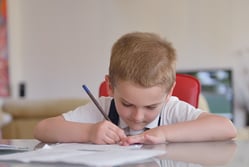First grade brings a lot of changes for your child. Their day has suddenly gotten longer, and the work they need to do takes more thought and time. For a lot of children, this transition can be tough, especially for the new expectations they have in reading and writing.
Along with the rest of their subjects, reading and writing has become more complex. Not only are they reading longer and more challenging books, they also need to write more detailed assignments. This is the point where they should be writing in full and complete sentences while learning the finer points of grammar and punctuation. In reading, they are reading longer, full books and should recognize about 150 words on sight. Some children will struggle with learning to read at this stage, others with learning to write well, and some with both.
Signs of Struggling in Language Arts
The first step to find out if your child is having a hard time with reading or writing is to look at their grades. If their writing tests are showing low marks when the rest of their subjects are fine, that’s a clear sign they are having a hard time in writing and reading. Similarly, if they seem to never finish their reading assignments but complete their other work, that can be a sign they are struggling. If you’re noticing a lot of reading and writing difficulties, you may want to visit the  doctor to look for vision problems or learning difficulties like dyslexia, which can start to show signs by first grade.
doctor to look for vision problems or learning difficulties like dyslexia, which can start to show signs by first grade.
The next step is to talk to your child’s teacher. They will be able to point out areas your child is having a hard time with, such as specific prompts, book topics, or grammar rules. You should also have a conversation with your child about their reading and writing. Ask them what they are interested in reading about—there could be something as simple as a lack of interest in the topics they’re seeing in school. They may also be feeling some anxiety, especially when writing for tests.
How to Help
After making sure your child isn’t having any vision or learning challenges, there are plenty of helpful things you can do to make reading and writing more fun and easy.
- Enroll them in Reading Genie. The best way for your child to become a better reader and writer is for them to practice. For a lot of students, what they get at school is not enough practice and is not engaging enough. At Reading Genie, they can get the practice they need while having fun. The teachers always give helpful and detailed feedback, building your child’s confidence as they learn.
- Understand their interests. Make sure to give them books on topics that interest them and encourage them to write stories they think are fun. For example, if they love animals, give them age-appropriate books about wildlife and animal characters and have them write stories about their favorite animals.
- Read with your child. Families that read together have children who read more, and enjoy it, too. Reading with them shows your child that reading is enjoyable and for everyone. It will also help to develop their vocabulary, and they can ask you questions as you both read, improving their understanding.
- Encourage them to be creative. It may not seem like it, but having your child draw or act out a play can be a great way to develop their writing skills. Writing is a form of communication, just like drawing and speaking. Have your child draw a picture and then explain it to you, then have them write their ideas and feelings down. There are no wrong answers, and all creative expressions can help build confidence.
There are a lot of fun ways to engage your child with reading and writing, especially if they come to Reading Genie. Reading and writing are essential skills, so it’s good to make sure early in their academic career they are engaged and having fun.
Sources
https://www.readabilitytutor.com/how-to-help1st-grader-read/





